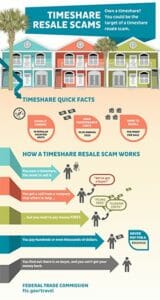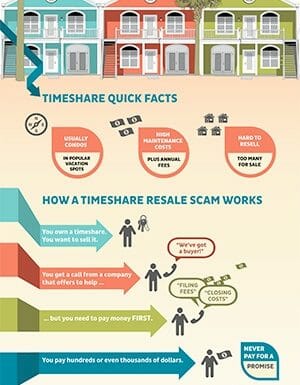
An announcement made during a Miami press conference called by the Federal Trade Commission (FTC – ftc.gov) announced a crackdown on timeshare resale scams. As someone who once had and tried to sell a timeshare, this news seems long overdue. The timeshare resale industry has been extremely lucrative for the companies who conduct these scams.
According to the announcement, more than 184 parties will be prosecuted by US Attorneys and local law enforcement. The crackdown also focuses on fraudulent travel prizes, and includes civil actions in 28 states and 25 actions in 10 other countries.
“Con artists take advantage of timeshare owners who have been in tough financial straits and are desperate to sell their timeshares,” Charles A. Harwood, Acting Director of the FTC’s Bureau of Consumer Protection, said during the press conference in Miami. “They persuade owners to pay fat up-front fees by saying they have someone ready to buy the property, but that’s a lie. Our message to timeshare owners is simple: never pay for a promise, get everything in writing first, and pay only after your unit is sold. Our message to timeshare resale scammers is simple, too: law enforcement agencies at every level of government are working together to put an end to this problem.”
Timeshare resale scams begin when an owner decides to sell a unit. The owner may be contacted by an agent who indicates that he has a buyer, but that the owner must pay money before being introduced to the buyer. The seller pays the con artist, who then stops responding to inquiries or attempts to make contact, and no buyer materializes. In the cases cited in the announcement, victims paid between $300 and $3,400 for services by three Florida companies named in the crackdown. Those companies were Resort Solution Trust, Inc., Resort Property Depot, Inc., and Vacation Communications Group, LLC. Federal courts froze the assets and operations of the organizations at the request of the FTC.
Wifredo A. Ferrer, U.S. Attorney for the Southern District of Florida also attended the press conference and said, “We cannot allow our elderly and vulnerable real property owners to continue to be the target of fraud schemes,” Ferrer said. “For that reason, our respective offices – federal and state, criminal and civil – have joined forces to combat Florida-based fraud schemes victimizing timeshare unit owners across the country. These victims, many of them elderly or in financial distress, looked to sell their units to help make ends meet or pay other bills. Instead, they were defrauded out of more than $14 million in total. Such fraud will not be tolerated.”
The Federal Trade Commission works for consumers to prevent fraudulent, deceptive, and unfair business practices and to provide information to help spot, stop, and avoid them. To file a complaint in English or Spanish, visit the FTC’s online Complaint Assistant or call 1-877-FTC-HELP (1-877-382-4357). The FTC has updated its consumer education materials on travel and timeshare resale frauds at ftc.gov/travel, which includes an interactive travel fraud game. The FTC also has a new infographic explaining how a timeshare resale scam works.

Recent Comments